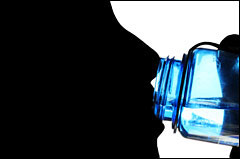Umbra,
Are aluminum bottles safer than Nalgene bottles? I’m looking at getting Sigg bottles for my self, wife, and son. Vendor agnostic, are the materials used by aluminum-only vendors safer than those that incorporate Lexan?
Chris Webber
Seattle, Wash.
Dearest Chris,
I swear, I pick questions and only then do I notice that yet again I have chosen one from Seattle. It is not a conspiracy. I just wanted a question to go with our recent perusal of safety in baby bottles. Here we have the adult bottles. We are avoiding clear bottles made from polycarbonate because they may leach bisphenol A into our fragile human bodies. Today we are talking about number seven in the recycling triangle. Seven indicates “other” plastics, often polycarbonate. (I should note that Nalgene makes bottles from other, less-yucky types of plastic.)

Lid pro quo.
Photo: iStockphoto
If you dozed off during Monday’s baby-bottle discussion, or if by chance you weren’t reading my column three years ago, there’s still time to click over and catch up. We’ll wait.
OK, now that you’re up on the science: bisphenol A is one of the chemicals whose monomers are key to the plastic polymers in polycarbonate (you may know it as 4,4′-dimethylmethylenediphenol). It may be a hormone disruptor that probably will eventually leak out of well-loved polycarbonate bottles. I am hedging because it’s science. Multiple studies about BPA and the human body’s hormones indicate that we should be concerned, the Food and Drug Administration and the American Chemistry Council feel confident that we should not. Apparently it’s not only polycarbonate bottles that leach BPA, but also the lining of metal food cans, according to a study by the Environmental Working Group. Sigh. So, there’s your potential problem with aluminum water bottles — the lining inside. Do visit the Environmental Working Group for much more information about the issue.
The only thing we know for sure about your particular polycarbonate bottle is that you are going to chuck it into the recycling bin and find a new water-carrying device. Leading us back to your question: Sigg is an aluminum-bottle manufacturer with excellent publicity. They make a variety of water bottles, including for kids, and have recently changed the lining of their aluminum drinking bottles in response to BPA concerns. I found a non-agnostic Sigg vendor offering quite a bit of information about issues with reusable drinking bottles and documents in support of Sigg’s water-based non-leaching linings. Another potential material for your family’s portable drinking vessels is food-grade stainless steel, and the same vendor will show you a range of the stainless-steel bottles on the market, aesthetically and functionally. You don’t have to shop there — I’m vendor agnostic. Thank you for teaching me a new phrase.
Are metals safer for your health than polycarbonate? It looks that way right now, but it also could be the known evil versus the unknown evil. We just don’t know what else will be uncovered in the future, and I’m not going to pretend that we do.
Although this question is about the health component of environmental concerns, I must yet again point out that ecologically, virgin aluminum is terrible. So if you are going to buy aluminum (or stainless steel for that matter), don’t lose it, and recycle it when you are done. And drive less.
Note-to-selfly,
Umbra

